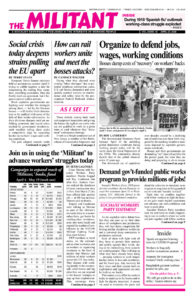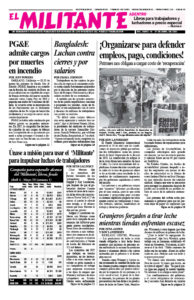May 1, 1995
WASHINGTON, D.C. — “The struggle the Cuban people are waging is a struggle for dignity, sovereignty, and the independence of our nation,” stated Cuban youth leader Kenia Serrano to an audience of some 95 people April 5 at George Washington University.
Working people feel the effects of the economic crisis in Cuba the most, explained Serrano, “but it is working people who accept the challenge to defend the social benefits” of the revolution. She pointed out that daily life is marked by “intense discussions.”
Members of the International Association of Machinists were able to meet Serrano in the break room at Washington’s National Airport. “Why are so many people leaving Cuba?” one young worker asked. Serrano responded, “People leave because conditions can get very hard. While 30,000 Cubans left, more than 9 million fighters for socialism remain.”
May 1, 1970
Before signing the New York abortion bill into law, Gov. [Nelson] Rockefeller was heard to comment, “Women’s liberation played an important part in the passage of this bill.” For once what Rockefeller said was true. Women in New York have built the strongest and most visible abortion repeal movement in the country.
The New York legislature repeatedly has voted down the most timid abortion reform measures. Now New York has one of the most liberal abortion laws in the country. Direct action by the movement in the form of demonstrations, legal suits, rallies, and a broad educational campaign will be necessary if we are to win facilities for the estimated 100,000 women who will want abortions (in New York alone) each year.
We must reject any concept that the struggle is over, or that this is merely a side issue in the overall struggle for liberation.
April 28, 1945
May Day in Europe this year has approached to the accompaniment of growing mass rebellion of the war-tortured peoples. In Germany and France, the workers are beginning to rise against capitalism and assert once more their determination to end the system which plunged them into the insane holocaust of misery and death.
On April 20 the Luxembourg radio reported that Germany was torn by civil war marked by “gigantic peace demonstrations” in Berlin and Munich. In Stuttgart, anti-Nazi groups were said to have seized control of the city administration.
Meanwhile, unrest is mounting in France. The General Federation of Labor’s call for a general strike on May Day asks the workers to protest against the new increase in the price of bread, the inadequate wages and the failure of the de Gaulle regime to carry out a real purge of fascist elements.

